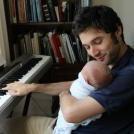Leaderboard
Popular Content
Showing content with the highest reputation on 12/17/2016 in all areas
-
That's one way of doing it. Not a big fan of ending the exposition ending in a half cadence...I like to end it in the dominant key, but I sometimes have a transitionary motif (usually derived from earlier material) that leads into the development section. Seni-G gave really good advice! The development section is basically to show your skills as a composer....think of it as structured improvisation. You can play with it almost any way you want to. The only rule is that you have to end the development and transition into the Recap without it being random and choppy. As for me personally, I don't really have a "formula"....I just take themes from the exposition and as Seni-G said, write mini variations. Usually I do this by putting the theme(s) in minor/major (depending on the exposition); putting the themes in weird, dissonant, unstable harmonic progressions; adding more counterpoint; taking a rhythmic motif from the exposition and playing around with that.2 points
-
So, as a pianist, and now also a recordist, I can't avoid comparing the amout of repertoire written for solo piano and solo recorder, the former is quite enormous, the latter is very scarce. So, I've decided to create this little challenge and encourage you guys to write something for solo alto recorder. Yay! As a prize, I will record the piece and post it here (the quality of the recording is similar to my Autumn Competition Entry "Variações sobre o Siriá"). I may also pick the piece to perform live in some performances I MAY have during my master's degree here (please, notice, I MAY have, it's not a promise). I don't have many guidelines for the entries. If you feel like you could do something, try. It'll be very welcome. I may even chose more than one piece. I've also attached some advice on writting for solo alto recorder. If you have any other doubt, feel free to ask here, and I'll answer. I'll set a deadline for January 9th. Participants: - bkho - luderart - Emiliano Manna - Monarcheon - Nikola Canada - fishyfry1 point
-
Are there any standards about how long the verse should be? Especially when compared to the chorus. My problem is that when I write lyrics, my verses are about the same size as the choruses, i.e. short. Is it okay to have short verses or should the verses be longer than choruses? Also, are there any other rules for verses? Also, sorry if I am in the wrong thread. Point me to the right one. 1 person likes this1 point
-
Hi everyone, first post here. I'm Nizar, I learned to play piano (on a synthesizer) empirically and only by ear through the years. I never took a lesson nor studied anything related to music or composition, so I'm quite ignorant about many aspects. However, I really enjoy the act of creation in music. I never thought of entering a composers' forum, so here I am. I'm extremely curious to get your feedback, it will be much appreciated, starting with this piece : Thank you! Nizar PS : I use Reaper and Kontakt for recording, as Virtual Instruments are 100x better and more realistic than my synthesizer. PS2 : I just bought a Kawai "stage piano" (ES8) last weekend, so the experience of playing is radically different and my inspiration is sky-rocketing :)1 point
-
FALL 2016: Competition Results! Congratulations to all the people who entered the competition. These are my favorite types of pieces to write and I’m glad I got to share that love with all of you. Without further ado here are your totaled scores and final results. Thank you all! Luderart - Eleven Piano Variations on Elgar's Violoncello Concerto's First Movement's Theme Monarcheon: 49/100 Sonataform: 70/100 Ken320: 90/100 TOTAL: 209/300 ChristianPerrotta - Variações sobre o Siriá Monarcheon: 69.5/100 Sonataform: 96/100 Ken320: 90/100 TOTAL: 255.5/300 bkho - Variations on "Happy Birthday Monarcheon: 80/100 Sonataform: 86/100 Ken320: 97/100 TOTAL: 263/300 danishali903 - Variations on a Theme By J. Brahms Monarcheon: 75/100 Sonataform: 96/100 Ken320: 98/100 TOTAL: 269/300 SebastianViola - 5 Variations on a theme from "Peter and the Wolf" for String Quartet Monarcheon: 61.5/100 Sonataform: 84/100 Ken320: 97/100 TOTAL: 242.5/300 Emiliano Manna - Seven Variations on a Rossini's Theme Monarcheon: 83/100 Sonataform: 96/100 Ken320: 100/100 TOTAL: 279/300 Noah Brode - Variations on a Theme of Dvořák Monarcheon: 62/100 Sonataform: 89/100 Ken320: 83/100 TOTAL: 234/300 TJS - Some More Variations on a Theme by Mozart Monarcheon: 70/100 Sonataform: 83/100 Ken320: 86/100 TOTAL: 239/300 RANKINGS: 1. EmilianoManna (279/300) 2. danishali903 (269/300) 3. bkho (263/300) Congratulations Emiliano Manna!1 point
-
The second movement to my WIP string quartet. You hear the first movement here (though I've made some adjustments since then). I feel pretty satisfied with how this one turned out, I'm getting used to using more variation in tempo (my other stuff in general stays the same tempo for the entirety of each movement), as well as working more on development, transitions, and use of double-stops. My only concern is the transition into the allegro con brio, I've rewritten it several times (and this is by far the best so far) but I still haven't gotten the change in character feeling completely natural.1 point
-
I agree with Blaire on this, but I'm not sure if I'd change the metre to be in 3, since the metre does sort itself out along the way. Changing it from being in 3 to being in 4 midway seems somewhat pedantic to me, if not a case of missing the point. Would you like the performers to accentuate the written metre against the implied metre of the figuration (the latter of which I note is punctuated by the first violin's notes)? Sorry I haven't had more to say, for I've only heard the beginning - but even then it has already piqued my interest; I'll return to it sometime.1 point
-
Oh! I wasn't expecting to fare so well against a lot of solid and large-scale entries (Danish and bkho, for example). A big, big thanks to all the judges and their detailed insight. They will be extremely useful to polish a Theme and Variations I'm currently working on. A question: I don't know how the hosting rules work for the competition. As a winner, I have to decide the next subject? Or to be a judge? Or I can be a normal participant?1 point
-
"Competition is for horses, not artists" I agree with this. I have competed so much during my life. I am so tired of it. "A creative artist works on his next composition, because he was not satisfied with his previous one" It seems like a rather perfectionistic quote. But maybe I misunderstand it. I don´t believe in insane perfectionism. A work of art does´nt have to be perfect to be great. It just have to be great. :-P Love is perfection. "I can´t understand, why people are afraid of new ideas. I am afraid of the old ones" Good one. Quote 18 is definetely not always true. Some of my compostions or should I say dream compostions are simply music from dreams, slightly modified, that I wrote down straight after I woke up in the middle of the night.1 point
-
Section at :31 was really strange and kind of came out of nowhere don't you think? After all that hellish (in a good way!) sounding stuff? The bells added later kind of add back to that feeling. But it was very strange to me personally. I can't see where that would fit in. I get that it's repeated in the climax, but there are better ways to make the climax sound more familiar than that. It's not too long either, since you layer things on top of it, previous material, which is nice. To extrapolate, when that soft A major section comes back afterward, I think it works much much better, because it feels like an aftermath. It doesn't work as well as a buildup. The vocal line on top is a great touch. Some of your sound effects sound very "trailer" esque. Not a bad thing, but I couldn't help but think that, even when it's supposed to be its own standalone thing. Ending is left on a dominant chord... half cadence. This should be fixed. Doesn't have to even be a tonic resolution, just something to make it feel more complete. Cheers!1 point
-
The way the beginning is really misleading... I heard it in 3, and when I found out it was written in 4, I just felt confused, not proven wrong. That's I think my major gripe in all of this. I like the transition to the Allegro con brio! I can imagine a real quartet playing it and it sounds nice. The way you wrote the sign is a bit confusing though. Also the stacatto on a tied cello note. The B section is pretty okay but sometimes falls into the same pit falls as the first point. I think it mostly holds together well, though. This movement's okay, just be a bit more cautious in how it's written...1 point
-
I like the changes in tempo it gives it a natural feeling. Sounds amazing man.1 point
-
Yay! I had a lot of fun with this, I really enjoyed everyone else's variations, and it turned out better than expected (next time I'll have to remember to write in bowings though >.>) No promises, but I am considering compiling a list of resources and my own comments with regards to writing for Viola & Viola (and Cello if I can find any references, as I am not familiar with that one first hand).1 point
-
2nd place!!!! Wohooo!!!! I would gladly take this score over what I got during Monarcheon's mock scoring of my other theme and variations! Congrats to Emiliano on a much deserved victory! His piece was just...wow! Congrats to all the other entrants too, and a big thank you to all the judges! We had a great turn out and wonderful entries this time around. Hopefully we can sustain this into the future.1 point
-
Here's what I like to do. I wouldn't call it "planning" necessarily, but more "sketching". I take a piece of my main themes that I particularly enjoy or think are rich with possibilities, and I just start coming up with variations on them. This is sketching. I am not trying to construct a finished piece at this stage, but simply generating ideas, the way a comic book artist might draw different versions of a character in his sketchbook. IMPORTANT: Do not try to create a masterpiece at this stage. You are just generating content, not creating a final draft. Don't over think it. If you have an idea you like, follow it to it's logical conclusion. Go where ever you like with the music. Development is free composing, so let your stream of consciousness take over. Try it in minor, try it in 6/8, try taking the main motif and inverting it, try the melody in the bass, try putting theme 1 in treble and theme 2 in the bass and fix up the harmony until it sounds musical and not just gimmicky. If you start an idea and run out of juice, set it aside and try another idea. Do not under any circumstances delete anything. No critics allowed at this stage. Just generate content and set it aside. Do this multiple times until you have more ideas than you can possibly use. Then take a break. Later, once you've forgotten what all the stuff you wrote sounds like, go back and listen to it all or play it through. You may hear some ideas that jump out at you, that excite you. Find an idea you created that you like, and picture where in the grand scheme you might like to see it appear. Does it feel like a climax or a lull? Is it a good ending, a good beginning, wacky all-over-the-place material that just sounds cool, transitional material, a sequence? Consider your best ideas to be like puzzle pieces and imagine how they might fit together. Then begin to craft them into actual art. Connect the ideas, develop the ideas so they aren't just vignettes but instead well-crafted parts of the larger story. Write spin-offs from the spin-offs. Try different ideas with different accompaniment. Try Alberti bass, then block chords, then sparse texture, then whatever you want to try. If you have created two ideas you wish to connect but they are in distant keys, transpose them (there is no shame in that). Take an idea you like and do one version in major and one in minor, or make the powerful final chord of that idea a 7th chord so that it wants to lead to a key change. Like creating a samurai sword, you must fold the steel over and over until it is just right. Don't worry about rules. You can begin and end in any key you wish. Even Beethoven wrote developments that ended up in different keys than he "should" have been in. He ended his developments when they sounded done, not when the key signature told him he was done. (see mvmnt. 1 of his sonata Op. 10 No. 2. The main theme is in the key of F, but when the development is over, he plays the main theme in the key of D. Why? Cuz he felt like it). I am a big fan of this sketching process, but it takes patience. If you sit down and try to plan your piece from beginning to end from scratch, you may feel overwhelmed by the task. But sketching will give you more material than you can use, and then you can edit yourself rather than sitting there wishing you had more musical material to work with. Plus you may end up with material you can spin into a different piece, or a different movement of the same sonata. Do that and, voila, your sonata will be united by similar motifs across all the movements. Good luck and keep writing music!1 point
-
The reviews are so detailed compared to the Summer Competition! This series of entries surprised me each time, so I'm glad you guys are getting the careful critique that I know we so often crave for our work.1 point
-
Congratulations to everyone, especially the winners! I particularly enjoyed this competition very much! The moments of composing, rehearsing, recording and researching for the program-writing were very fun. Also, thanks for the judges for their patience in writing the reviews, they are much valuable! I hope the next competition is just as fun as this one^^ (or better!)1 point
-
Congratulations to all of you for making it this far, and a hearty round of applause from me for our three prize-winners, Emiliano Manna, danishali903 and bkho. I am happy to see that this competition has managed to draw out a great deal of inventiveness and flair from our members, and I was especially pleased with the increased effort at professionalism from our panel of judges. Many thanks to Monarcheon for co-ordinating this competition and seeing it through to fruition. Well done, all!1 point
-
In early music (baroque, especially) it's customary to end on a half cadence, then start the development in the dominant, then simply resolve the dominant to the tonic for the recapitulation. It's not standard, but I've always found using a secondary dominant to do this is easiest, if you're having trouble making it sound smooth. Contemporary music fudges the rules a lot, and basically just calls more motivic embellishment.1 point
-
Well, since Monarcheon and Ken have pointed out the technical shortcomings, let me focus on the positive side and the subjective impression. I enjoyed the piece from start to finish. It creates a great atmosphere, not in spite of but because of the repetition. What I can advise you is to not be afraid to create your own style of music, to forge your own path in composition, to be original. If composers didn't do that, all music would be uniform, even though technically excellent. Moreover, it is amazing what you have been able to achieve completely on your own. That is something I think you should be congratulated for.1 point









